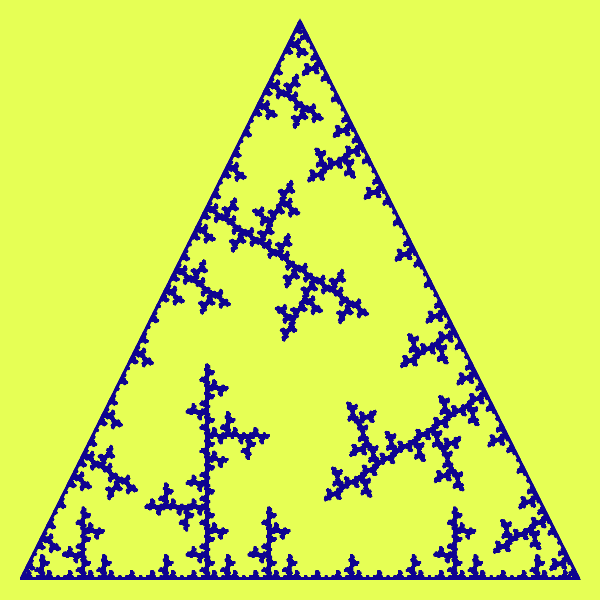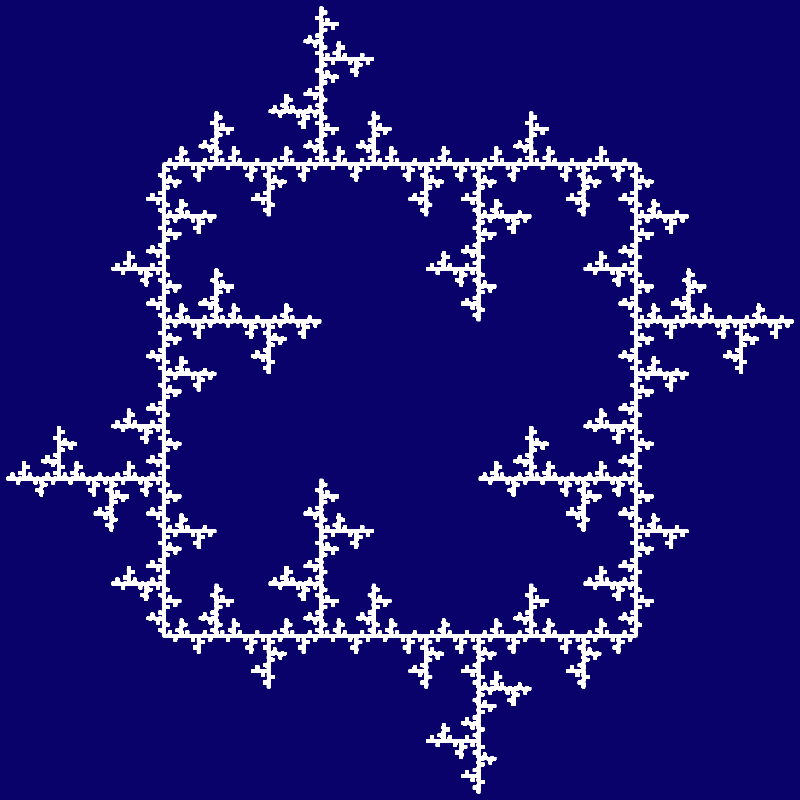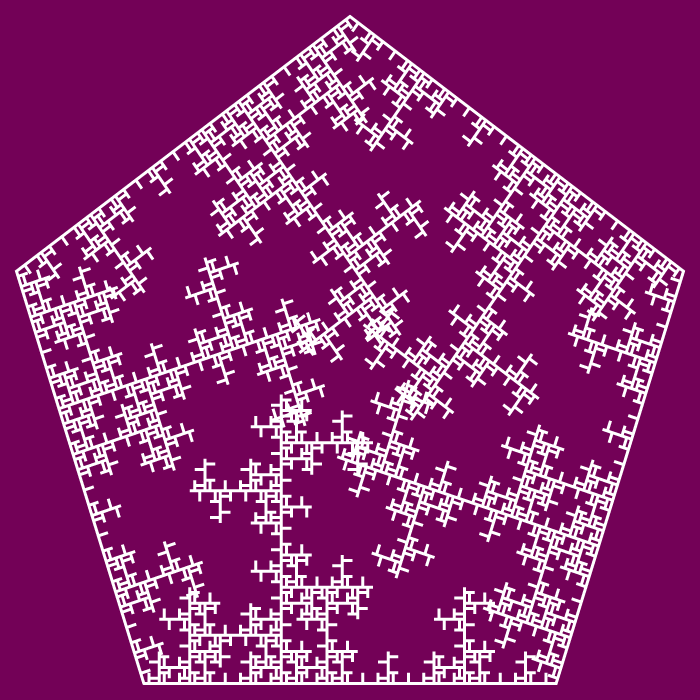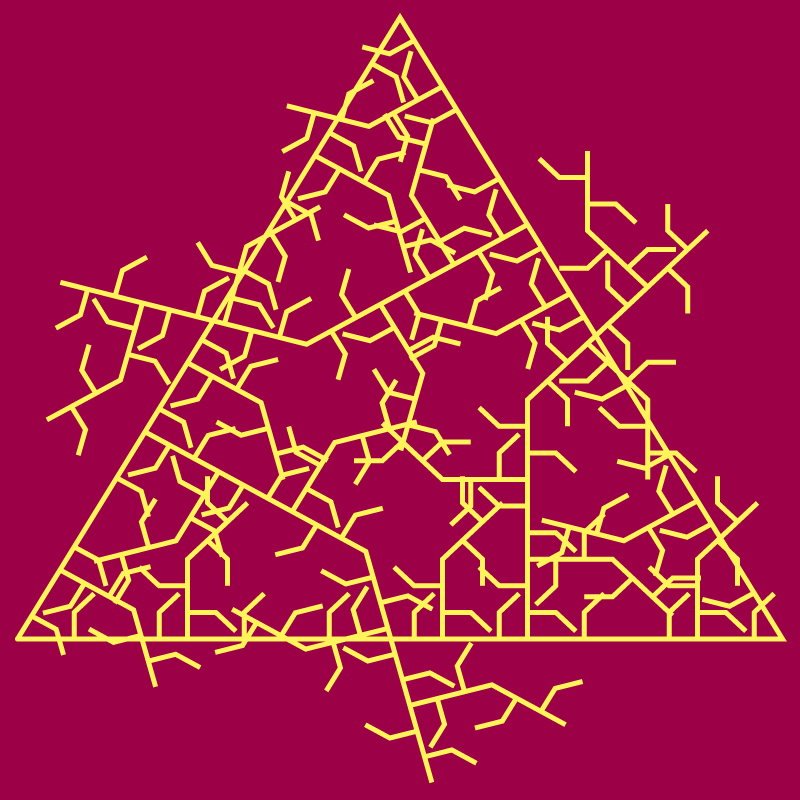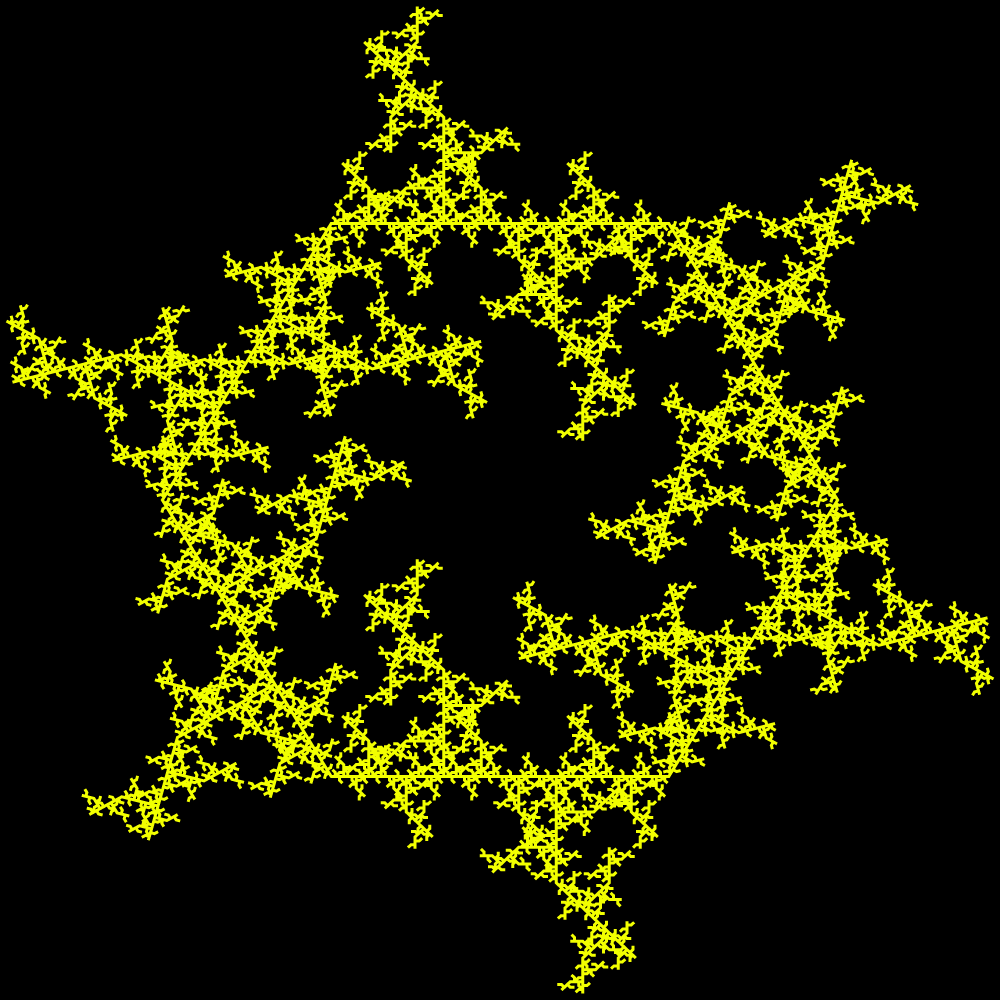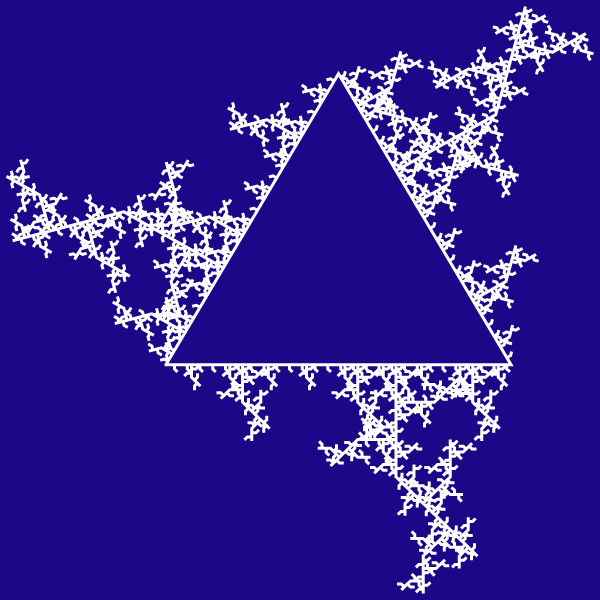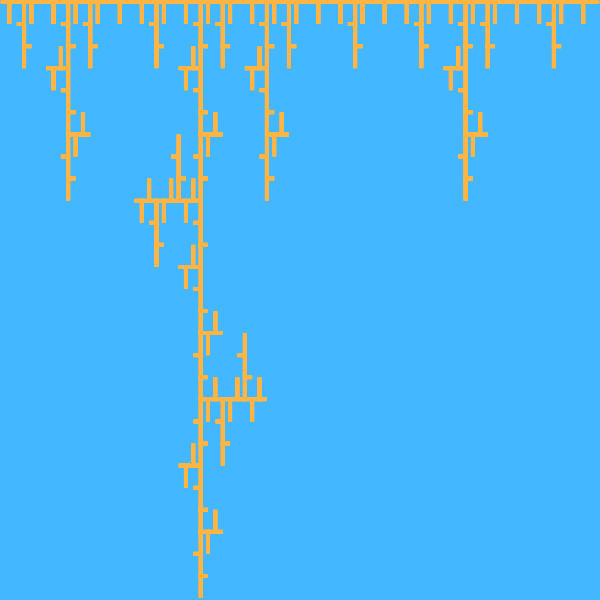This utility lets you draw cool and frosty ice fractals. You are offered five customizable variants of this fractal – two single spike forms, one double spike form, and two bent forms. Each of these types differ by the recursive segment generator (motif). Each of these ice fractals can be configured to evolve from any size regular polygon and you can adjust the number of recursive replacements (iterations). For each fractal type, you can also customize their mode – set the reverse mode that uses a mirror copy of the motif or the inverse mode that uses an upside down motif. To change the snowflake and polygon size, you can adjust the canvas size and padding. To draw a colorful fractal, you can select colors for the background and spikes. You can also change the fractal's orientation and adjust the motif line thickness. Fun fact – the frosty fractal is the most popular fractal found in nature as that's how snowflakes freeze. Created by fractal fans from team Browserling. Fractabulous!
This utility lets you draw cool and frosty ice fractals. You are offered five customizable variants of this fractal – two single spike forms, one double spike form, and two bent forms. Each of these types differ by the recursive segment generator (motif). Each of these ice fractals can be configured to evolve from any size regular polygon and you can adjust the number of recursive replacements (iterations). For each fractal type, you can also customize their mode – set the reverse mode that uses a mirror copy of the motif or the inverse mode that uses an upside down motif. To change the snowflake and polygon size, you can adjust the canvas size and padding. To draw a colorful fractal, you can select colors for the background and spikes. You can also change the fractal's orientation and adjust the motif line thickness. Fun fact – the frosty fractal is the most popular fractal found in nature as that's how snowflakes freeze. Created by fractal fans from team Browserling. Fractabulous!

This online browser-based tool illustrates the unique icy fractal. The icy fractal, also known as the arctic fractal is a self-similar fractal, based on a simple geometric base shape and a simple generating motif. The base shape can be any n-sided polygon, a pair of lines, or a single line. There are five types of generating motif – single spike, double spike, long single spike, bent single spike and bent double spike form (and two options to customize them via reverse and inverse operations). The fractal starts with a regular polygon and at each next iteration stage, each edge is replaced by the motif. Depending on the status of the inverse mode, you can get polygonal or anti-polygonal fractals, and depending on the status of the reverse mode, you can get symmetrical polygonal fractals. The simple operation of replacing an edge with a spike motif closely resembles fern frost and snowflake formation. Mind blowing and ingenious at the same time, or as we love to say – fractabulous!
This online browser-based tool illustrates the unique icy fractal. The icy fractal, also known as the arctic fractal is a self-similar fractal, based on a simple geometric base shape and a simple generating motif. The base shape can be any n-sided polygon, a pair of lines, or a single line. There are five types of generating motif – single spike, double spike, long single spike, bent single spike and bent double spike form (and two options to customize them via reverse and inverse operations). The fractal starts with a regular polygon and at each next iteration stage, each edge is replaced by the motif. Depending on the status of the inverse mode, you can get polygonal or anti-polygonal fractals, and depending on the status of the reverse mode, you can get symmetrical polygonal fractals. The simple operation of replacing an edge with a spike motif closely resembles fern frost and snowflake formation. Mind blowing and ingenious at the same time, or as we love to say – fractabulous!
In this example, we generate the single spike form fractal based on an equilateral triangle. We set the inverse mode to true and as a result, we get an anti-triangular frosty fractal. We make 7 recursive motif replacements on a 600x600 pixels canvas, with a line width of 3 pixels and a padding of 20 pixels.
This example uses the double spike generator on a square base. As one of the spikes is pointing inside the square and the other spike is pointing outside the square, we get a symmetric square with icy spikes pointing in all directions around the square. It draws a white curve for six iterative steps on a navy blue canvas with the size of 800x800 pixels.
In this example, we've selected the third form that uses a single long ice needle as the generator. It creates a frigid stellar anti-dendrite fractal based on a pentagon. The long single spike motif is very similar to the single spike motif but it's 2 times longer. As a result, we get a completely different fractal. We draw the 5th recursive step on a pompadour color canvas.
In this example, we've set the ice fractal on fire. This fractal uses fiery colors and is generated from a single bent spike motif on a triangular base. The spike emerges from the generator at an angle of 90 degrees and then bends again at 45 degrees. We draw the reverse and inverse form at the fourth iteration stage, using a 5-pixel thick flaming line.
In this example, we set the hexagon ice crystal as a base and generate the hexaice fractal using the double-bent spike motif. In this case, the ice needles grow to both sides of the line segment (this is why we get the crystal forming inside and outside of the hexagon) and they both bend at 45 degrees but in opposite directions. We use a large canvas of 1000x1000 pixels, and create 5 recursive replacements with a yellow color generator line on a black background.
In this example, we iterate the glacial fractal from a triangle and a bent spike. As the spike is pointing outwards the glacial ice also expands outwards. We run 5 iterations of the algorithm and draw this fractal on an ultramarine color background with the size of 600px by 600px.
This example demonstrates that the base figure can also be a single-dimensional line. In this case, we get an ice dam fractal that grows from the top down. We're using 0-pixel padding so the initial line is at the very top of the drawing and the longest ice crystal grows to the bottom of the drawing.
You can pass options to this tool using their codes as query arguments and it will automatically compute output. To get the code of an option, just hover over its icon. Here's how to type it in your browser's address bar. Click to try!
Walk the Hilbert fractal and enumerate its coordinates.
Walk the Peano fractal and enumerate its coordinates.
Walk the Moore fractal and enumerate its coordinates.
Encode the Hilbert fractal as a string.
Encode the Peano fractal as a string.
Encode the Moore fractal as a string.
Encode the Cantor set as a string.
Encode the Heighway Dragon as a string.
Encode the Sierpinski fractal as a string.
Generate a Sierpinski tetrahedron (tetrix) fractal.
Generate a Cantor's cube fractal.
Generate a Sierpinski-Menger fractal.
Generate a Jerusalem cube fractal.
Generate a Jeaninne Mosely fractal.
Generate a Mandelbrot tree fractal.
Generate a Barnsley's tree fractal.
Generate a Barnsley's fern fractal.
Generate a binary tree fractal.
Generate a ternary tree fractal.
Generate a dragon tree fractal.
Generate a de Rham curve.
Generate a Takagi-Landsberg fractal curve.
Generate a Peano pentagon fractal curve.
Generate a tridendrite fractal curve.
Generate a Pentigree fractal curve.
Generate a lucky seven fractal curve.
Generate an Eisenstein fractions fractal curve.
Generate a Bagula double five fractal curve.
Generate a Julia fractal set.
Generate a Mandelbrot fractal set.
Generate a Mandelbulb fractal.
Generate a Mandelbox fractal.
Generate a Buddhabrot fractal.
Generate a Burning Ship fractal.
Generate a toothpick sequence fractal.
Generate an Ulam-Warburton fractal curve.
Generate an ASCII fractal.
Generate an ANSI fractal.
Generate a Unicode fractal.
Generate an emoji fractal.
Generate a braille code fractal.
Generate a fractal in audio form.
Create a fractal that looks like one but isn't a fractal.
Generate a fractal from any text.
Generate a fractal from a string.
Generate a fractal from a number.
Join any two fractals together.
Create a completely random fractal.
Set up an arbitrary IFS system and iterate it.
Recursively transform an image using IFS rules.
Run infinite compositions of analytic functions.
Create a surface that mimics a natural terrain.
Create a fractal surface via Brownian motion.
Apply fractal algorithms on your image and make it self-similar.
Find fractal patterns in any given image.
Find fractal patterns in any given text.
Find fractal patterns in any given number.
Tessellate a plane with fractals.
Run a cellular automaton with custom rules.
Play Conway's Game of Life on an infinite grid.
Subscribe to our updates. We'll let you know when we release new tools, features, and organize online workshops.
Enter your email here
We're Browserling — a friendly and fun cross-browser testing company powered by alien technology. At Browserling our mission is to make people's lives easier, so we created this collection of fractal tools. Our tools have the simplest user interface that doesn't require advanced computer skills and they are used by millions of people every month. Our fractal tools are actually powered by our web developer tools that we created over the last couple of years. Check them out!
